Transformational Leadership: Reflection on Experiences & Development
VerifiedAdded on 2023/06/15
|12
|3481
|364
Essay
AI Summary
This essay reflects on the development of leadership traits through personal experiences and the lens of transformational leadership theory. It begins by defining leadership and highlighting the positive impacts of effective leadership on employee morale, dedication, job satisfaction, and retention. The essay then delves into the four key aspects of transformational leadership: individualized consideration, intellectual stimulation, inspirational motivation, and idealized influence, explaining how these aspects help leaders overcome challenges such as poor time management, negative employee behaviors, and lack of emotional intelligence. The author shares a negative experience where a lack of feedback and support led to poor teamwork and low employee morale, emphasizing the importance of communication and valuing employee input. Conversely, a positive experience involving mentoring a team of interns demonstrates the application of transformational leadership principles to improve team performance and morale. The essay concludes by reinforcing the value of these experiences in shaping the author's leadership abilities and highlighting the benefits of transformational leadership in fostering a positive and productive work environment.
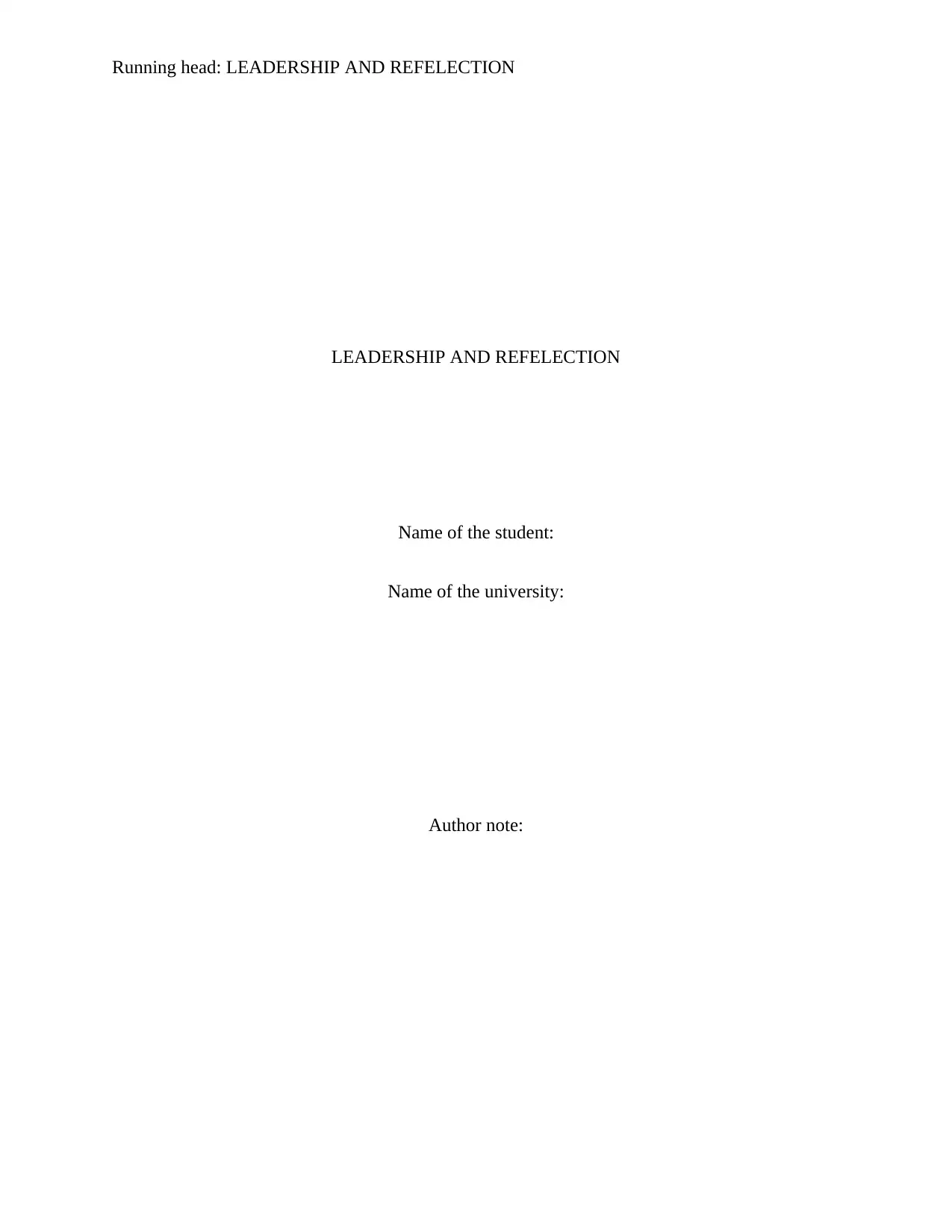
Running head: LEADERSHIP AND REFELECTION
LEADERSHIP AND REFELECTION
Name of the student:
Name of the university:
Author note:
LEADERSHIP AND REFELECTION
Name of the student:
Name of the university:
Author note:
Paraphrase This Document
Need a fresh take? Get an instant paraphrase of this document with our AI Paraphraser
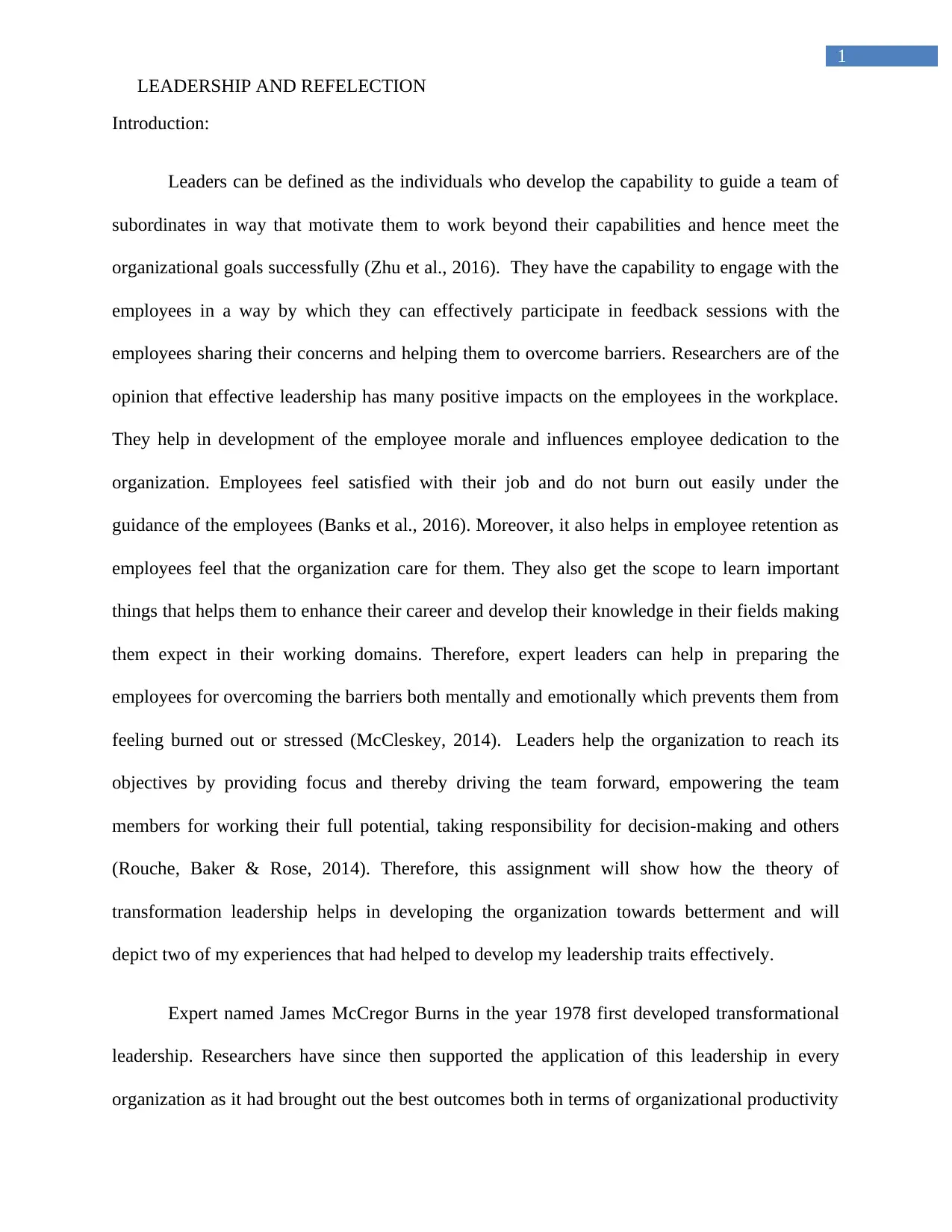
1
LEADERSHIP AND REFELECTION
Introduction:
Leaders can be defined as the individuals who develop the capability to guide a team of
subordinates in way that motivate them to work beyond their capabilities and hence meet the
organizational goals successfully (Zhu et al., 2016). They have the capability to engage with the
employees in a way by which they can effectively participate in feedback sessions with the
employees sharing their concerns and helping them to overcome barriers. Researchers are of the
opinion that effective leadership has many positive impacts on the employees in the workplace.
They help in development of the employee morale and influences employee dedication to the
organization. Employees feel satisfied with their job and do not burn out easily under the
guidance of the employees (Banks et al., 2016). Moreover, it also helps in employee retention as
employees feel that the organization care for them. They also get the scope to learn important
things that helps them to enhance their career and develop their knowledge in their fields making
them expect in their working domains. Therefore, expert leaders can help in preparing the
employees for overcoming the barriers both mentally and emotionally which prevents them from
feeling burned out or stressed (McCleskey, 2014). Leaders help the organization to reach its
objectives by providing focus and thereby driving the team forward, empowering the team
members for working their full potential, taking responsibility for decision-making and others
(Rouche, Baker & Rose, 2014). Therefore, this assignment will show how the theory of
transformation leadership helps in developing the organization towards betterment and will
depict two of my experiences that had helped to develop my leadership traits effectively.
Expert named James McCregor Burns in the year 1978 first developed transformational
leadership. Researchers have since then supported the application of this leadership in every
organization as it had brought out the best outcomes both in terms of organizational productivity
LEADERSHIP AND REFELECTION
Introduction:
Leaders can be defined as the individuals who develop the capability to guide a team of
subordinates in way that motivate them to work beyond their capabilities and hence meet the
organizational goals successfully (Zhu et al., 2016). They have the capability to engage with the
employees in a way by which they can effectively participate in feedback sessions with the
employees sharing their concerns and helping them to overcome barriers. Researchers are of the
opinion that effective leadership has many positive impacts on the employees in the workplace.
They help in development of the employee morale and influences employee dedication to the
organization. Employees feel satisfied with their job and do not burn out easily under the
guidance of the employees (Banks et al., 2016). Moreover, it also helps in employee retention as
employees feel that the organization care for them. They also get the scope to learn important
things that helps them to enhance their career and develop their knowledge in their fields making
them expect in their working domains. Therefore, expert leaders can help in preparing the
employees for overcoming the barriers both mentally and emotionally which prevents them from
feeling burned out or stressed (McCleskey, 2014). Leaders help the organization to reach its
objectives by providing focus and thereby driving the team forward, empowering the team
members for working their full potential, taking responsibility for decision-making and others
(Rouche, Baker & Rose, 2014). Therefore, this assignment will show how the theory of
transformation leadership helps in developing the organization towards betterment and will
depict two of my experiences that had helped to develop my leadership traits effectively.
Expert named James McCregor Burns in the year 1978 first developed transformational
leadership. Researchers have since then supported the application of this leadership in every
organization as it had brought out the best outcomes both in terms of organizational productivity
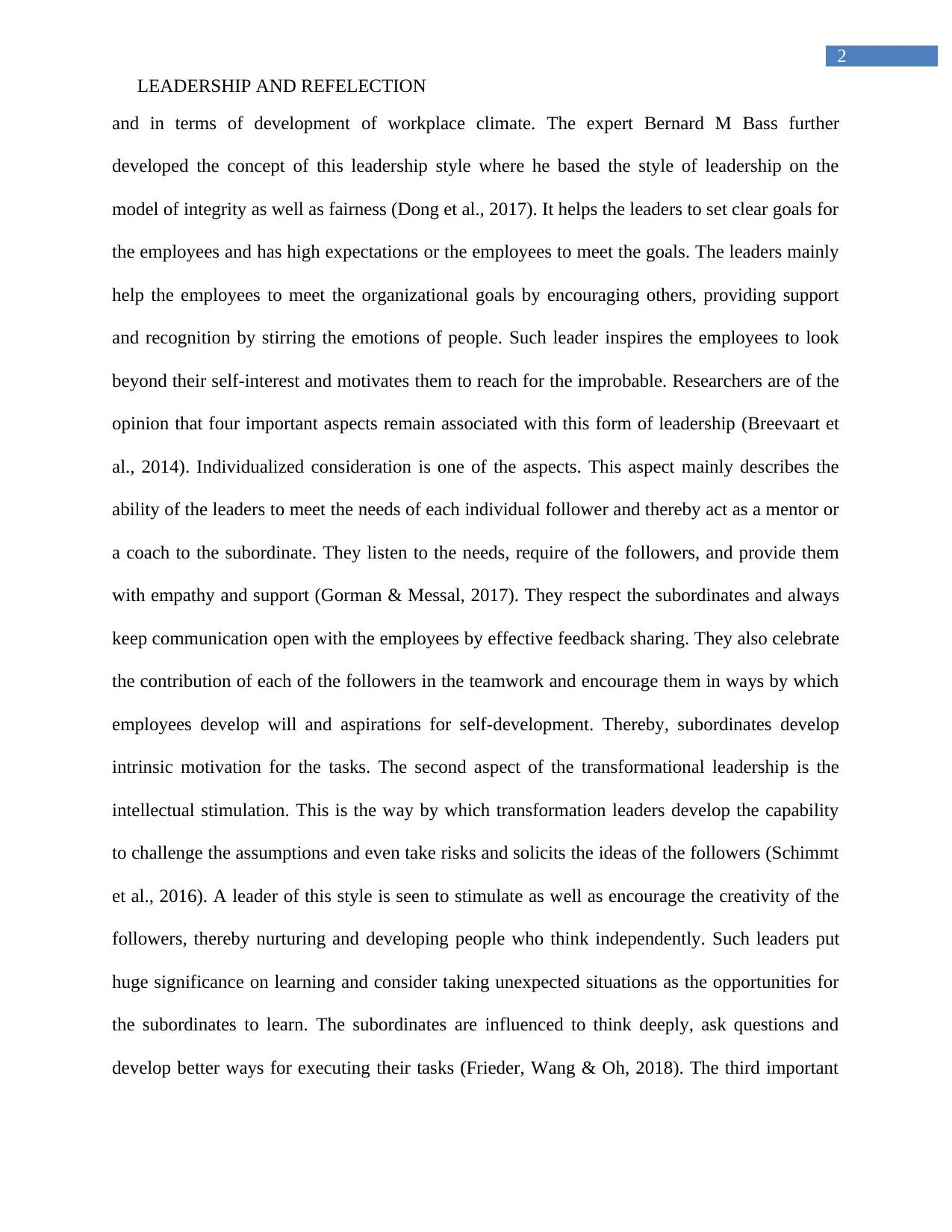
2
LEADERSHIP AND REFELECTION
and in terms of development of workplace climate. The expert Bernard M Bass further
developed the concept of this leadership style where he based the style of leadership on the
model of integrity as well as fairness (Dong et al., 2017). It helps the leaders to set clear goals for
the employees and has high expectations or the employees to meet the goals. The leaders mainly
help the employees to meet the organizational goals by encouraging others, providing support
and recognition by stirring the emotions of people. Such leader inspires the employees to look
beyond their self-interest and motivates them to reach for the improbable. Researchers are of the
opinion that four important aspects remain associated with this form of leadership (Breevaart et
al., 2014). Individualized consideration is one of the aspects. This aspect mainly describes the
ability of the leaders to meet the needs of each individual follower and thereby act as a mentor or
a coach to the subordinate. They listen to the needs, require of the followers, and provide them
with empathy and support (Gorman & Messal, 2017). They respect the subordinates and always
keep communication open with the employees by effective feedback sharing. They also celebrate
the contribution of each of the followers in the teamwork and encourage them in ways by which
employees develop will and aspirations for self-development. Thereby, subordinates develop
intrinsic motivation for the tasks. The second aspect of the transformational leadership is the
intellectual stimulation. This is the way by which transformation leaders develop the capability
to challenge the assumptions and even take risks and solicits the ideas of the followers (Schimmt
et al., 2016). A leader of this style is seen to stimulate as well as encourage the creativity of the
followers, thereby nurturing and developing people who think independently. Such leaders put
huge significance on learning and consider taking unexpected situations as the opportunities for
the subordinates to learn. The subordinates are influenced to think deeply, ask questions and
develop better ways for executing their tasks (Frieder, Wang & Oh, 2018). The third important
LEADERSHIP AND REFELECTION
and in terms of development of workplace climate. The expert Bernard M Bass further
developed the concept of this leadership style where he based the style of leadership on the
model of integrity as well as fairness (Dong et al., 2017). It helps the leaders to set clear goals for
the employees and has high expectations or the employees to meet the goals. The leaders mainly
help the employees to meet the organizational goals by encouraging others, providing support
and recognition by stirring the emotions of people. Such leader inspires the employees to look
beyond their self-interest and motivates them to reach for the improbable. Researchers are of the
opinion that four important aspects remain associated with this form of leadership (Breevaart et
al., 2014). Individualized consideration is one of the aspects. This aspect mainly describes the
ability of the leaders to meet the needs of each individual follower and thereby act as a mentor or
a coach to the subordinate. They listen to the needs, require of the followers, and provide them
with empathy and support (Gorman & Messal, 2017). They respect the subordinates and always
keep communication open with the employees by effective feedback sharing. They also celebrate
the contribution of each of the followers in the teamwork and encourage them in ways by which
employees develop will and aspirations for self-development. Thereby, subordinates develop
intrinsic motivation for the tasks. The second aspect of the transformational leadership is the
intellectual stimulation. This is the way by which transformation leaders develop the capability
to challenge the assumptions and even take risks and solicits the ideas of the followers (Schimmt
et al., 2016). A leader of this style is seen to stimulate as well as encourage the creativity of the
followers, thereby nurturing and developing people who think independently. Such leaders put
huge significance on learning and consider taking unexpected situations as the opportunities for
the subordinates to learn. The subordinates are influenced to think deeply, ask questions and
develop better ways for executing their tasks (Frieder, Wang & Oh, 2018). The third important
⊘ This is a preview!⊘
Do you want full access?
Subscribe today to unlock all pages.

Trusted by 1+ million students worldwide
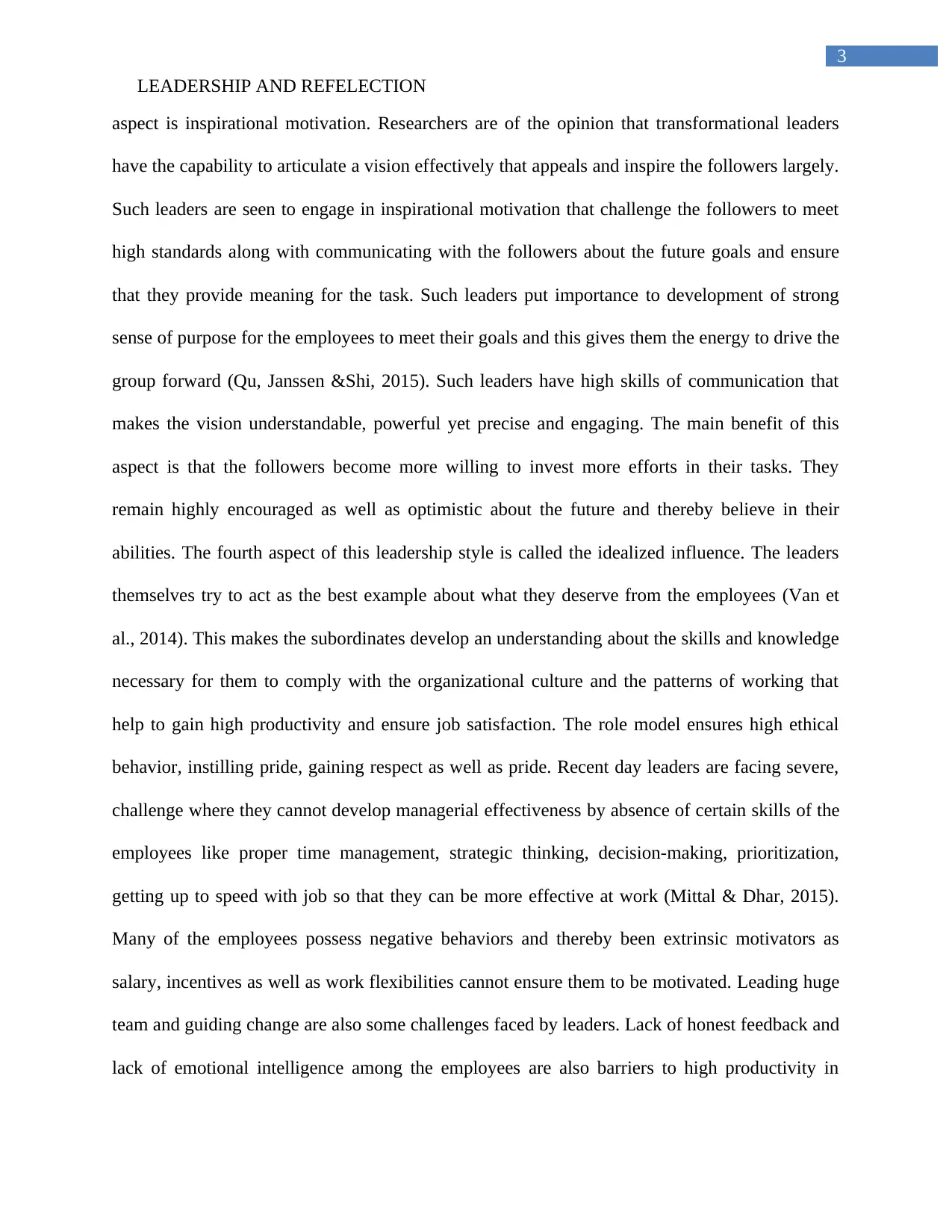
3
LEADERSHIP AND REFELECTION
aspect is inspirational motivation. Researchers are of the opinion that transformational leaders
have the capability to articulate a vision effectively that appeals and inspire the followers largely.
Such leaders are seen to engage in inspirational motivation that challenge the followers to meet
high standards along with communicating with the followers about the future goals and ensure
that they provide meaning for the task. Such leaders put importance to development of strong
sense of purpose for the employees to meet their goals and this gives them the energy to drive the
group forward (Qu, Janssen &Shi, 2015). Such leaders have high skills of communication that
makes the vision understandable, powerful yet precise and engaging. The main benefit of this
aspect is that the followers become more willing to invest more efforts in their tasks. They
remain highly encouraged as well as optimistic about the future and thereby believe in their
abilities. The fourth aspect of this leadership style is called the idealized influence. The leaders
themselves try to act as the best example about what they deserve from the employees (Van et
al., 2014). This makes the subordinates develop an understanding about the skills and knowledge
necessary for them to comply with the organizational culture and the patterns of working that
help to gain high productivity and ensure job satisfaction. The role model ensures high ethical
behavior, instilling pride, gaining respect as well as pride. Recent day leaders are facing severe,
challenge where they cannot develop managerial effectiveness by absence of certain skills of the
employees like proper time management, strategic thinking, decision-making, prioritization,
getting up to speed with job so that they can be more effective at work (Mittal & Dhar, 2015).
Many of the employees possess negative behaviors and thereby been extrinsic motivators as
salary, incentives as well as work flexibilities cannot ensure them to be motivated. Leading huge
team and guiding change are also some challenges faced by leaders. Lack of honest feedback and
lack of emotional intelligence among the employees are also barriers to high productivity in
LEADERSHIP AND REFELECTION
aspect is inspirational motivation. Researchers are of the opinion that transformational leaders
have the capability to articulate a vision effectively that appeals and inspire the followers largely.
Such leaders are seen to engage in inspirational motivation that challenge the followers to meet
high standards along with communicating with the followers about the future goals and ensure
that they provide meaning for the task. Such leaders put importance to development of strong
sense of purpose for the employees to meet their goals and this gives them the energy to drive the
group forward (Qu, Janssen &Shi, 2015). Such leaders have high skills of communication that
makes the vision understandable, powerful yet precise and engaging. The main benefit of this
aspect is that the followers become more willing to invest more efforts in their tasks. They
remain highly encouraged as well as optimistic about the future and thereby believe in their
abilities. The fourth aspect of this leadership style is called the idealized influence. The leaders
themselves try to act as the best example about what they deserve from the employees (Van et
al., 2014). This makes the subordinates develop an understanding about the skills and knowledge
necessary for them to comply with the organizational culture and the patterns of working that
help to gain high productivity and ensure job satisfaction. The role model ensures high ethical
behavior, instilling pride, gaining respect as well as pride. Recent day leaders are facing severe,
challenge where they cannot develop managerial effectiveness by absence of certain skills of the
employees like proper time management, strategic thinking, decision-making, prioritization,
getting up to speed with job so that they can be more effective at work (Mittal & Dhar, 2015).
Many of the employees possess negative behaviors and thereby been extrinsic motivators as
salary, incentives as well as work flexibilities cannot ensure them to be motivated. Leading huge
team and guiding change are also some challenges faced by leaders. Lack of honest feedback and
lack of emotional intelligence among the employees are also barriers to high productivity in
Paraphrase This Document
Need a fresh take? Get an instant paraphrase of this document with our AI Paraphraser
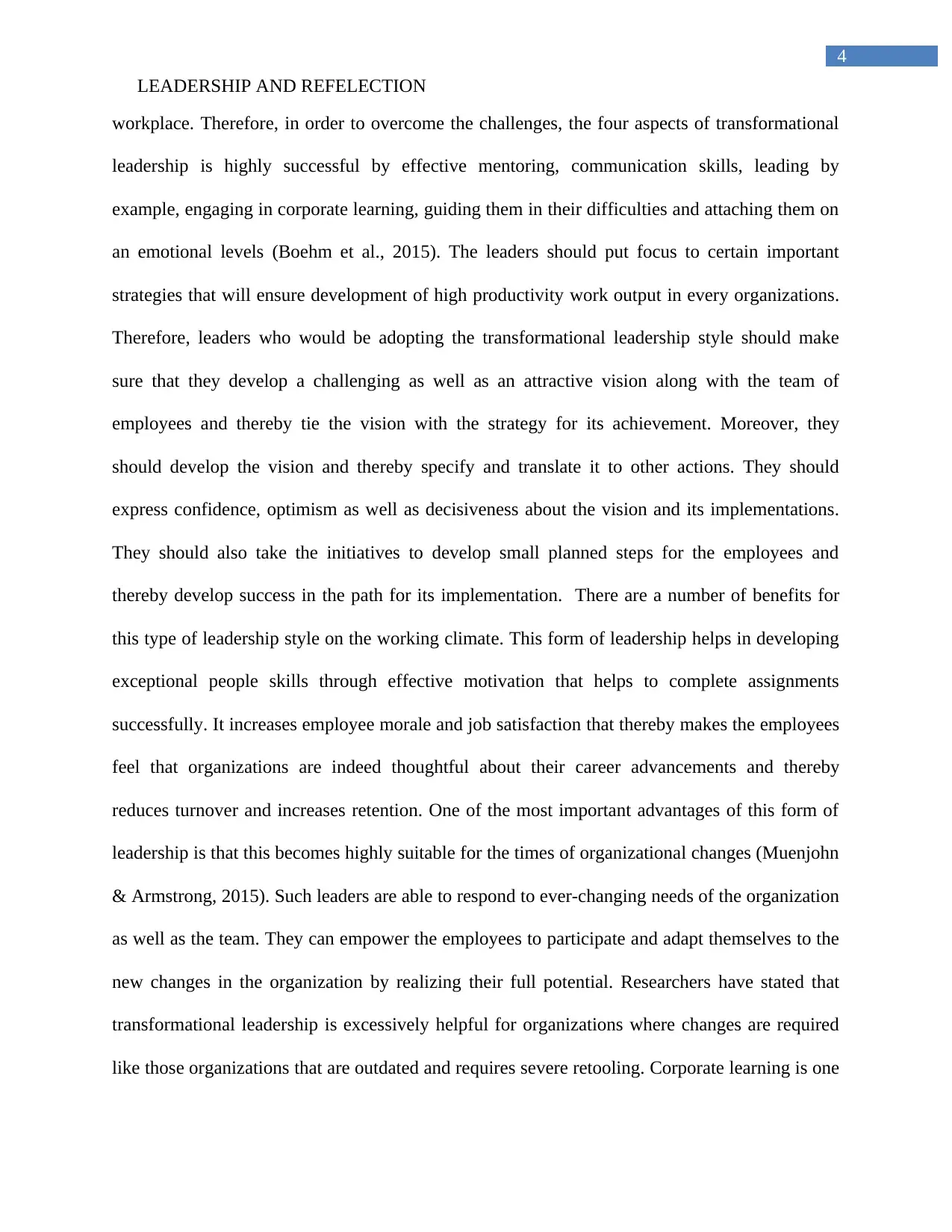
4
LEADERSHIP AND REFELECTION
workplace. Therefore, in order to overcome the challenges, the four aspects of transformational
leadership is highly successful by effective mentoring, communication skills, leading by
example, engaging in corporate learning, guiding them in their difficulties and attaching them on
an emotional levels (Boehm et al., 2015). The leaders should put focus to certain important
strategies that will ensure development of high productivity work output in every organizations.
Therefore, leaders who would be adopting the transformational leadership style should make
sure that they develop a challenging as well as an attractive vision along with the team of
employees and thereby tie the vision with the strategy for its achievement. Moreover, they
should develop the vision and thereby specify and translate it to other actions. They should
express confidence, optimism as well as decisiveness about the vision and its implementations.
They should also take the initiatives to develop small planned steps for the employees and
thereby develop success in the path for its implementation. There are a number of benefits for
this type of leadership style on the working climate. This form of leadership helps in developing
exceptional people skills through effective motivation that helps to complete assignments
successfully. It increases employee morale and job satisfaction that thereby makes the employees
feel that organizations are indeed thoughtful about their career advancements and thereby
reduces turnover and increases retention. One of the most important advantages of this form of
leadership is that this becomes highly suitable for the times of organizational changes (Muenjohn
& Armstrong, 2015). Such leaders are able to respond to ever-changing needs of the organization
as well as the team. They can empower the employees to participate and adapt themselves to the
new changes in the organization by realizing their full potential. Researchers have stated that
transformational leadership is excessively helpful for organizations where changes are required
like those organizations that are outdated and requires severe retooling. Corporate learning is one
LEADERSHIP AND REFELECTION
workplace. Therefore, in order to overcome the challenges, the four aspects of transformational
leadership is highly successful by effective mentoring, communication skills, leading by
example, engaging in corporate learning, guiding them in their difficulties and attaching them on
an emotional levels (Boehm et al., 2015). The leaders should put focus to certain important
strategies that will ensure development of high productivity work output in every organizations.
Therefore, leaders who would be adopting the transformational leadership style should make
sure that they develop a challenging as well as an attractive vision along with the team of
employees and thereby tie the vision with the strategy for its achievement. Moreover, they
should develop the vision and thereby specify and translate it to other actions. They should
express confidence, optimism as well as decisiveness about the vision and its implementations.
They should also take the initiatives to develop small planned steps for the employees and
thereby develop success in the path for its implementation. There are a number of benefits for
this type of leadership style on the working climate. This form of leadership helps in developing
exceptional people skills through effective motivation that helps to complete assignments
successfully. It increases employee morale and job satisfaction that thereby makes the employees
feel that organizations are indeed thoughtful about their career advancements and thereby
reduces turnover and increases retention. One of the most important advantages of this form of
leadership is that this becomes highly suitable for the times of organizational changes (Muenjohn
& Armstrong, 2015). Such leaders are able to respond to ever-changing needs of the organization
as well as the team. They can empower the employees to participate and adapt themselves to the
new changes in the organization by realizing their full potential. Researchers have stated that
transformational leadership is excessively helpful for organizations where changes are required
like those organizations that are outdated and requires severe retooling. Corporate learning is one
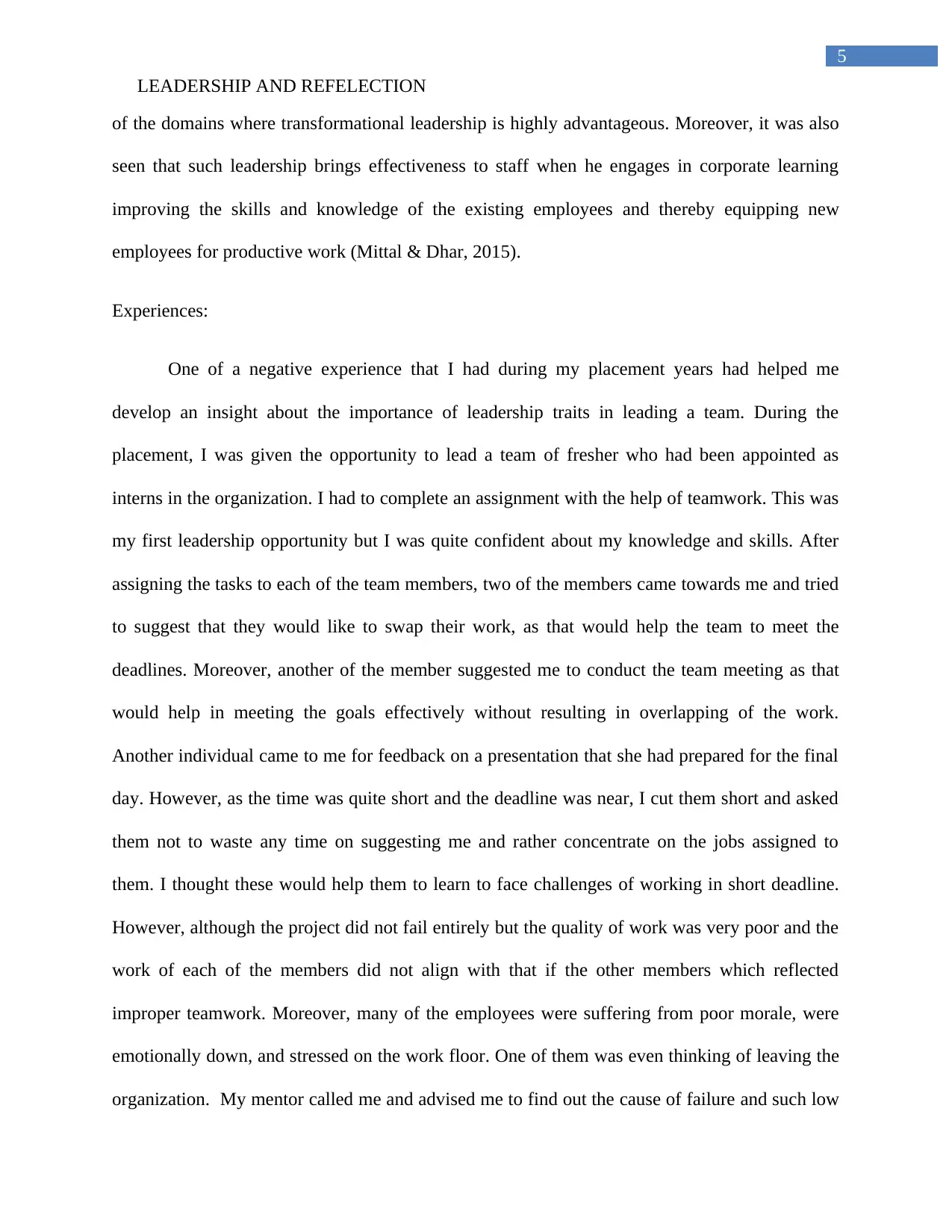
5
LEADERSHIP AND REFELECTION
of the domains where transformational leadership is highly advantageous. Moreover, it was also
seen that such leadership brings effectiveness to staff when he engages in corporate learning
improving the skills and knowledge of the existing employees and thereby equipping new
employees for productive work (Mittal & Dhar, 2015).
Experiences:
One of a negative experience that I had during my placement years had helped me
develop an insight about the importance of leadership traits in leading a team. During the
placement, I was given the opportunity to lead a team of fresher who had been appointed as
interns in the organization. I had to complete an assignment with the help of teamwork. This was
my first leadership opportunity but I was quite confident about my knowledge and skills. After
assigning the tasks to each of the team members, two of the members came towards me and tried
to suggest that they would like to swap their work, as that would help the team to meet the
deadlines. Moreover, another of the member suggested me to conduct the team meeting as that
would help in meeting the goals effectively without resulting in overlapping of the work.
Another individual came to me for feedback on a presentation that she had prepared for the final
day. However, as the time was quite short and the deadline was near, I cut them short and asked
them not to waste any time on suggesting me and rather concentrate on the jobs assigned to
them. I thought these would help them to learn to face challenges of working in short deadline.
However, although the project did not fail entirely but the quality of work was very poor and the
work of each of the members did not align with that if the other members which reflected
improper teamwork. Moreover, many of the employees were suffering from poor morale, were
emotionally down, and stressed on the work floor. One of them was even thinking of leaving the
organization. My mentor called me and advised me to find out the cause of failure and such low
LEADERSHIP AND REFELECTION
of the domains where transformational leadership is highly advantageous. Moreover, it was also
seen that such leadership brings effectiveness to staff when he engages in corporate learning
improving the skills and knowledge of the existing employees and thereby equipping new
employees for productive work (Mittal & Dhar, 2015).
Experiences:
One of a negative experience that I had during my placement years had helped me
develop an insight about the importance of leadership traits in leading a team. During the
placement, I was given the opportunity to lead a team of fresher who had been appointed as
interns in the organization. I had to complete an assignment with the help of teamwork. This was
my first leadership opportunity but I was quite confident about my knowledge and skills. After
assigning the tasks to each of the team members, two of the members came towards me and tried
to suggest that they would like to swap their work, as that would help the team to meet the
deadlines. Moreover, another of the member suggested me to conduct the team meeting as that
would help in meeting the goals effectively without resulting in overlapping of the work.
Another individual came to me for feedback on a presentation that she had prepared for the final
day. However, as the time was quite short and the deadline was near, I cut them short and asked
them not to waste any time on suggesting me and rather concentrate on the jobs assigned to
them. I thought these would help them to learn to face challenges of working in short deadline.
However, although the project did not fail entirely but the quality of work was very poor and the
work of each of the members did not align with that if the other members which reflected
improper teamwork. Moreover, many of the employees were suffering from poor morale, were
emotionally down, and stressed on the work floor. One of them was even thinking of leaving the
organization. My mentor called me and advised me to find out the cause of failure and such low
⊘ This is a preview!⊘
Do you want full access?
Subscribe today to unlock all pages.

Trusted by 1+ million students worldwide
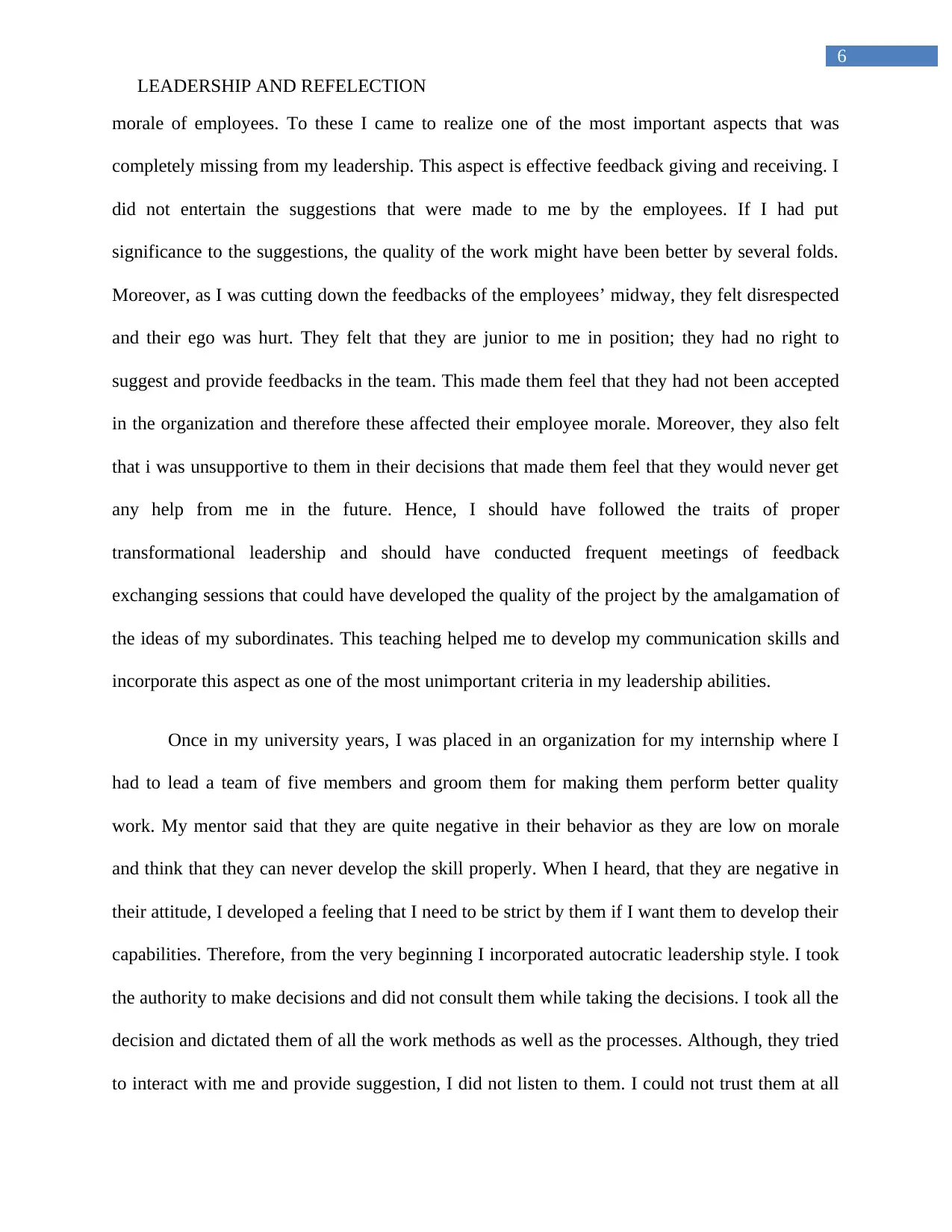
6
LEADERSHIP AND REFELECTION
morale of employees. To these I came to realize one of the most important aspects that was
completely missing from my leadership. This aspect is effective feedback giving and receiving. I
did not entertain the suggestions that were made to me by the employees. If I had put
significance to the suggestions, the quality of the work might have been better by several folds.
Moreover, as I was cutting down the feedbacks of the employees’ midway, they felt disrespected
and their ego was hurt. They felt that they are junior to me in position; they had no right to
suggest and provide feedbacks in the team. This made them feel that they had not been accepted
in the organization and therefore these affected their employee morale. Moreover, they also felt
that i was unsupportive to them in their decisions that made them feel that they would never get
any help from me in the future. Hence, I should have followed the traits of proper
transformational leadership and should have conducted frequent meetings of feedback
exchanging sessions that could have developed the quality of the project by the amalgamation of
the ideas of my subordinates. This teaching helped me to develop my communication skills and
incorporate this aspect as one of the most unimportant criteria in my leadership abilities.
Once in my university years, I was placed in an organization for my internship where I
had to lead a team of five members and groom them for making them perform better quality
work. My mentor said that they are quite negative in their behavior as they are low on morale
and think that they can never develop the skill properly. When I heard, that they are negative in
their attitude, I developed a feeling that I need to be strict by them if I want them to develop their
capabilities. Therefore, from the very beginning I incorporated autocratic leadership style. I took
the authority to make decisions and did not consult them while taking the decisions. I took all the
decision and dictated them of all the work methods as well as the processes. Although, they tried
to interact with me and provide suggestion, I did not listen to them. I could not trust them at all
LEADERSHIP AND REFELECTION
morale of employees. To these I came to realize one of the most important aspects that was
completely missing from my leadership. This aspect is effective feedback giving and receiving. I
did not entertain the suggestions that were made to me by the employees. If I had put
significance to the suggestions, the quality of the work might have been better by several folds.
Moreover, as I was cutting down the feedbacks of the employees’ midway, they felt disrespected
and their ego was hurt. They felt that they are junior to me in position; they had no right to
suggest and provide feedbacks in the team. This made them feel that they had not been accepted
in the organization and therefore these affected their employee morale. Moreover, they also felt
that i was unsupportive to them in their decisions that made them feel that they would never get
any help from me in the future. Hence, I should have followed the traits of proper
transformational leadership and should have conducted frequent meetings of feedback
exchanging sessions that could have developed the quality of the project by the amalgamation of
the ideas of my subordinates. This teaching helped me to develop my communication skills and
incorporate this aspect as one of the most unimportant criteria in my leadership abilities.
Once in my university years, I was placed in an organization for my internship where I
had to lead a team of five members and groom them for making them perform better quality
work. My mentor said that they are quite negative in their behavior as they are low on morale
and think that they can never develop the skill properly. When I heard, that they are negative in
their attitude, I developed a feeling that I need to be strict by them if I want them to develop their
capabilities. Therefore, from the very beginning I incorporated autocratic leadership style. I took
the authority to make decisions and did not consult them while taking the decisions. I took all the
decision and dictated them of all the work methods as well as the processes. Although, they tried
to interact with me and provide suggestion, I did not listen to them. I could not trust them at all
Paraphrase This Document
Need a fresh take? Get an instant paraphrase of this document with our AI Paraphraser
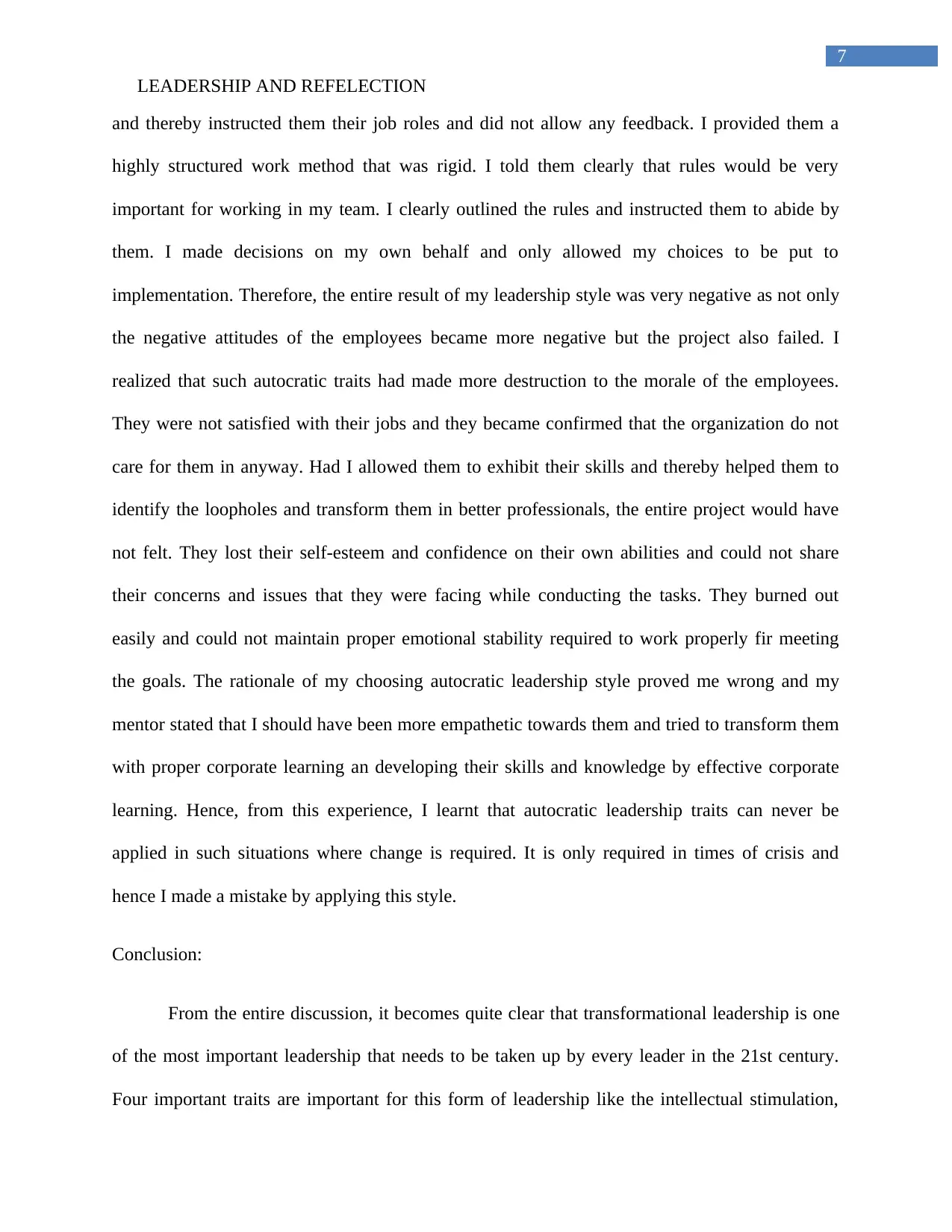
7
LEADERSHIP AND REFELECTION
and thereby instructed them their job roles and did not allow any feedback. I provided them a
highly structured work method that was rigid. I told them clearly that rules would be very
important for working in my team. I clearly outlined the rules and instructed them to abide by
them. I made decisions on my own behalf and only allowed my choices to be put to
implementation. Therefore, the entire result of my leadership style was very negative as not only
the negative attitudes of the employees became more negative but the project also failed. I
realized that such autocratic traits had made more destruction to the morale of the employees.
They were not satisfied with their jobs and they became confirmed that the organization do not
care for them in anyway. Had I allowed them to exhibit their skills and thereby helped them to
identify the loopholes and transform them in better professionals, the entire project would have
not felt. They lost their self-esteem and confidence on their own abilities and could not share
their concerns and issues that they were facing while conducting the tasks. They burned out
easily and could not maintain proper emotional stability required to work properly fir meeting
the goals. The rationale of my choosing autocratic leadership style proved me wrong and my
mentor stated that I should have been more empathetic towards them and tried to transform them
with proper corporate learning an developing their skills and knowledge by effective corporate
learning. Hence, from this experience, I learnt that autocratic leadership traits can never be
applied in such situations where change is required. It is only required in times of crisis and
hence I made a mistake by applying this style.
Conclusion:
From the entire discussion, it becomes quite clear that transformational leadership is one
of the most important leadership that needs to be taken up by every leader in the 21st century.
Four important traits are important for this form of leadership like the intellectual stimulation,
LEADERSHIP AND REFELECTION
and thereby instructed them their job roles and did not allow any feedback. I provided them a
highly structured work method that was rigid. I told them clearly that rules would be very
important for working in my team. I clearly outlined the rules and instructed them to abide by
them. I made decisions on my own behalf and only allowed my choices to be put to
implementation. Therefore, the entire result of my leadership style was very negative as not only
the negative attitudes of the employees became more negative but the project also failed. I
realized that such autocratic traits had made more destruction to the morale of the employees.
They were not satisfied with their jobs and they became confirmed that the organization do not
care for them in anyway. Had I allowed them to exhibit their skills and thereby helped them to
identify the loopholes and transform them in better professionals, the entire project would have
not felt. They lost their self-esteem and confidence on their own abilities and could not share
their concerns and issues that they were facing while conducting the tasks. They burned out
easily and could not maintain proper emotional stability required to work properly fir meeting
the goals. The rationale of my choosing autocratic leadership style proved me wrong and my
mentor stated that I should have been more empathetic towards them and tried to transform them
with proper corporate learning an developing their skills and knowledge by effective corporate
learning. Hence, from this experience, I learnt that autocratic leadership traits can never be
applied in such situations where change is required. It is only required in times of crisis and
hence I made a mistake by applying this style.
Conclusion:
From the entire discussion, it becomes quite clear that transformational leadership is one
of the most important leadership that needs to be taken up by every leader in the 21st century.
Four important traits are important for this form of leadership like the intellectual stimulation,
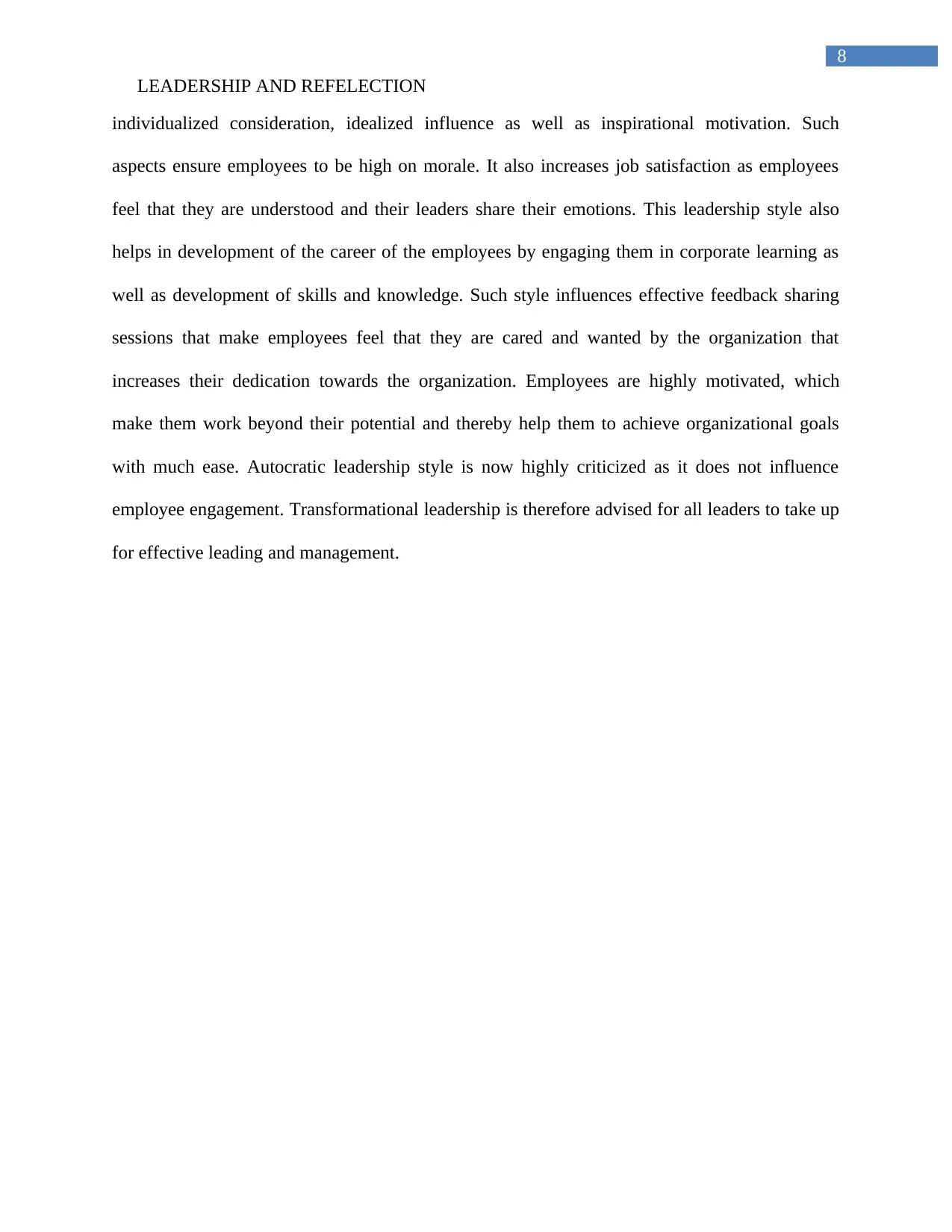
8
LEADERSHIP AND REFELECTION
individualized consideration, idealized influence as well as inspirational motivation. Such
aspects ensure employees to be high on morale. It also increases job satisfaction as employees
feel that they are understood and their leaders share their emotions. This leadership style also
helps in development of the career of the employees by engaging them in corporate learning as
well as development of skills and knowledge. Such style influences effective feedback sharing
sessions that make employees feel that they are cared and wanted by the organization that
increases their dedication towards the organization. Employees are highly motivated, which
make them work beyond their potential and thereby help them to achieve organizational goals
with much ease. Autocratic leadership style is now highly criticized as it does not influence
employee engagement. Transformational leadership is therefore advised for all leaders to take up
for effective leading and management.
LEADERSHIP AND REFELECTION
individualized consideration, idealized influence as well as inspirational motivation. Such
aspects ensure employees to be high on morale. It also increases job satisfaction as employees
feel that they are understood and their leaders share their emotions. This leadership style also
helps in development of the career of the employees by engaging them in corporate learning as
well as development of skills and knowledge. Such style influences effective feedback sharing
sessions that make employees feel that they are cared and wanted by the organization that
increases their dedication towards the organization. Employees are highly motivated, which
make them work beyond their potential and thereby help them to achieve organizational goals
with much ease. Autocratic leadership style is now highly criticized as it does not influence
employee engagement. Transformational leadership is therefore advised for all leaders to take up
for effective leading and management.
⊘ This is a preview!⊘
Do you want full access?
Subscribe today to unlock all pages.

Trusted by 1+ million students worldwide
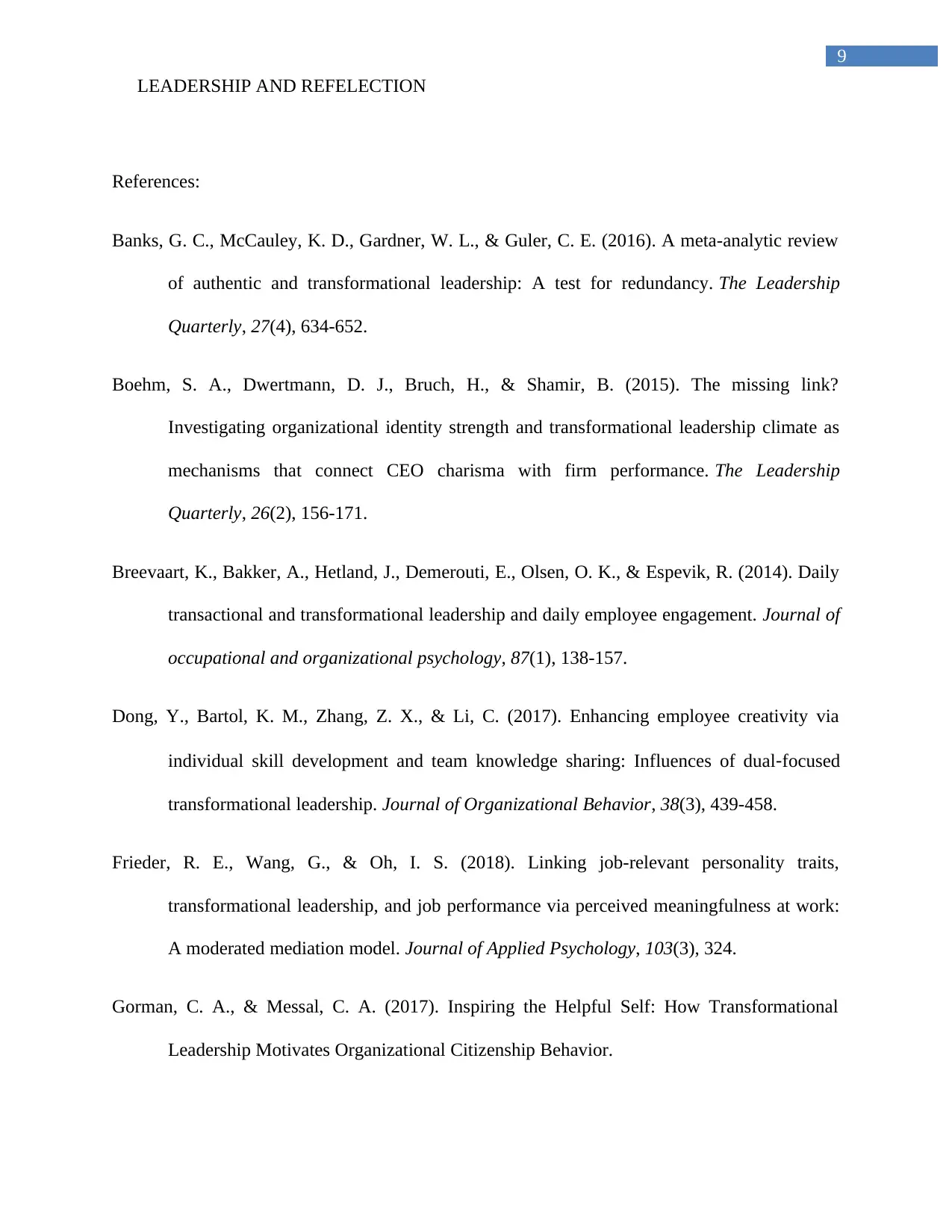
9
LEADERSHIP AND REFELECTION
References:
Banks, G. C., McCauley, K. D., Gardner, W. L., & Guler, C. E. (2016). A meta-analytic review
of authentic and transformational leadership: A test for redundancy. The Leadership
Quarterly, 27(4), 634-652.
Boehm, S. A., Dwertmann, D. J., Bruch, H., & Shamir, B. (2015). The missing link?
Investigating organizational identity strength and transformational leadership climate as
mechanisms that connect CEO charisma with firm performance. The Leadership
Quarterly, 26(2), 156-171.
Breevaart, K., Bakker, A., Hetland, J., Demerouti, E., Olsen, O. K., & Espevik, R. (2014). Daily
transactional and transformational leadership and daily employee engagement. Journal of
occupational and organizational psychology, 87(1), 138-157.
Dong, Y., Bartol, K. M., Zhang, Z. X., & Li, C. (2017). Enhancing employee creativity via
individual skill development and team knowledge sharing: Influences of dual‐focused
transformational leadership. Journal of Organizational Behavior, 38(3), 439-458.
Frieder, R. E., Wang, G., & Oh, I. S. (2018). Linking job-relevant personality traits,
transformational leadership, and job performance via perceived meaningfulness at work:
A moderated mediation model. Journal of Applied Psychology, 103(3), 324.
Gorman, C. A., & Messal, C. A. (2017). Inspiring the Helpful Self: How Transformational
Leadership Motivates Organizational Citizenship Behavior.
LEADERSHIP AND REFELECTION
References:
Banks, G. C., McCauley, K. D., Gardner, W. L., & Guler, C. E. (2016). A meta-analytic review
of authentic and transformational leadership: A test for redundancy. The Leadership
Quarterly, 27(4), 634-652.
Boehm, S. A., Dwertmann, D. J., Bruch, H., & Shamir, B. (2015). The missing link?
Investigating organizational identity strength and transformational leadership climate as
mechanisms that connect CEO charisma with firm performance. The Leadership
Quarterly, 26(2), 156-171.
Breevaart, K., Bakker, A., Hetland, J., Demerouti, E., Olsen, O. K., & Espevik, R. (2014). Daily
transactional and transformational leadership and daily employee engagement. Journal of
occupational and organizational psychology, 87(1), 138-157.
Dong, Y., Bartol, K. M., Zhang, Z. X., & Li, C. (2017). Enhancing employee creativity via
individual skill development and team knowledge sharing: Influences of dual‐focused
transformational leadership. Journal of Organizational Behavior, 38(3), 439-458.
Frieder, R. E., Wang, G., & Oh, I. S. (2018). Linking job-relevant personality traits,
transformational leadership, and job performance via perceived meaningfulness at work:
A moderated mediation model. Journal of Applied Psychology, 103(3), 324.
Gorman, C. A., & Messal, C. A. (2017). Inspiring the Helpful Self: How Transformational
Leadership Motivates Organizational Citizenship Behavior.
Paraphrase This Document
Need a fresh take? Get an instant paraphrase of this document with our AI Paraphraser
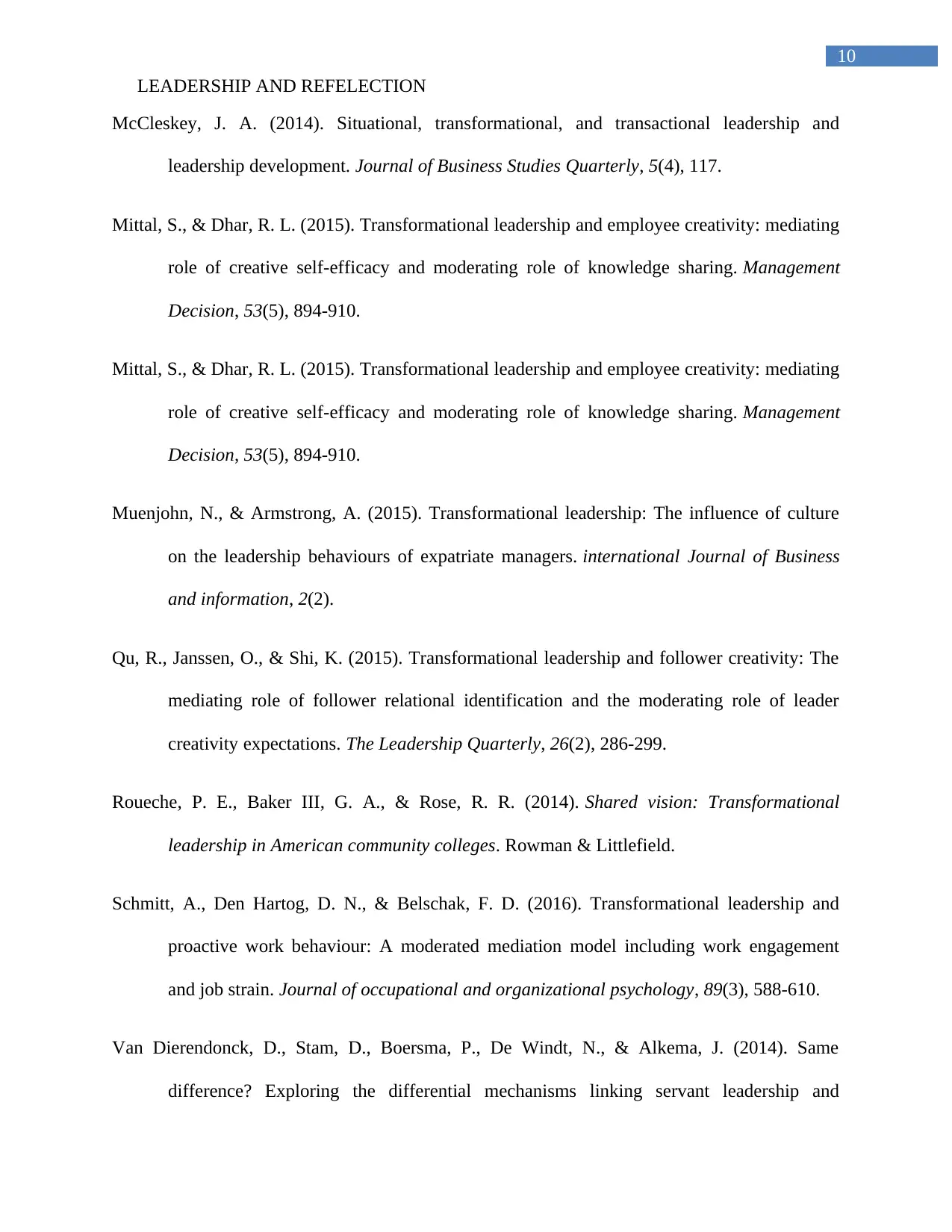
10
LEADERSHIP AND REFELECTION
McCleskey, J. A. (2014). Situational, transformational, and transactional leadership and
leadership development. Journal of Business Studies Quarterly, 5(4), 117.
Mittal, S., & Dhar, R. L. (2015). Transformational leadership and employee creativity: mediating
role of creative self-efficacy and moderating role of knowledge sharing. Management
Decision, 53(5), 894-910.
Mittal, S., & Dhar, R. L. (2015). Transformational leadership and employee creativity: mediating
role of creative self-efficacy and moderating role of knowledge sharing. Management
Decision, 53(5), 894-910.
Muenjohn, N., & Armstrong, A. (2015). Transformational leadership: The influence of culture
on the leadership behaviours of expatriate managers. international Journal of Business
and information, 2(2).
Qu, R., Janssen, O., & Shi, K. (2015). Transformational leadership and follower creativity: The
mediating role of follower relational identification and the moderating role of leader
creativity expectations. The Leadership Quarterly, 26(2), 286-299.
Roueche, P. E., Baker III, G. A., & Rose, R. R. (2014). Shared vision: Transformational
leadership in American community colleges. Rowman & Littlefield.
Schmitt, A., Den Hartog, D. N., & Belschak, F. D. (2016). Transformational leadership and
proactive work behaviour: A moderated mediation model including work engagement
and job strain. Journal of occupational and organizational psychology, 89(3), 588-610.
Van Dierendonck, D., Stam, D., Boersma, P., De Windt, N., & Alkema, J. (2014). Same
difference? Exploring the differential mechanisms linking servant leadership and
LEADERSHIP AND REFELECTION
McCleskey, J. A. (2014). Situational, transformational, and transactional leadership and
leadership development. Journal of Business Studies Quarterly, 5(4), 117.
Mittal, S., & Dhar, R. L. (2015). Transformational leadership and employee creativity: mediating
role of creative self-efficacy and moderating role of knowledge sharing. Management
Decision, 53(5), 894-910.
Mittal, S., & Dhar, R. L. (2015). Transformational leadership and employee creativity: mediating
role of creative self-efficacy and moderating role of knowledge sharing. Management
Decision, 53(5), 894-910.
Muenjohn, N., & Armstrong, A. (2015). Transformational leadership: The influence of culture
on the leadership behaviours of expatriate managers. international Journal of Business
and information, 2(2).
Qu, R., Janssen, O., & Shi, K. (2015). Transformational leadership and follower creativity: The
mediating role of follower relational identification and the moderating role of leader
creativity expectations. The Leadership Quarterly, 26(2), 286-299.
Roueche, P. E., Baker III, G. A., & Rose, R. R. (2014). Shared vision: Transformational
leadership in American community colleges. Rowman & Littlefield.
Schmitt, A., Den Hartog, D. N., & Belschak, F. D. (2016). Transformational leadership and
proactive work behaviour: A moderated mediation model including work engagement
and job strain. Journal of occupational and organizational psychology, 89(3), 588-610.
Van Dierendonck, D., Stam, D., Boersma, P., De Windt, N., & Alkema, J. (2014). Same
difference? Exploring the differential mechanisms linking servant leadership and

11
LEADERSHIP AND REFELECTION
transformational leadership to follower outcomes. The Leadership Quarterly, 25(3), 544-
562.
Zhu, W., Avolio, B. J., & Walumbwa, F. O. (2016). " Moderating role of follower characteristics
with transformational leadership and follower work engagement": Corrigendum.
LEADERSHIP AND REFELECTION
transformational leadership to follower outcomes. The Leadership Quarterly, 25(3), 544-
562.
Zhu, W., Avolio, B. J., & Walumbwa, F. O. (2016). " Moderating role of follower characteristics
with transformational leadership and follower work engagement": Corrigendum.
⊘ This is a preview!⊘
Do you want full access?
Subscribe today to unlock all pages.

Trusted by 1+ million students worldwide
1 out of 12
Related Documents
Your All-in-One AI-Powered Toolkit for Academic Success.
+13062052269
info@desklib.com
Available 24*7 on WhatsApp / Email
![[object Object]](/_next/static/media/star-bottom.7253800d.svg)
Unlock your academic potential
Copyright © 2020–2026 A2Z Services. All Rights Reserved. Developed and managed by ZUCOL.





